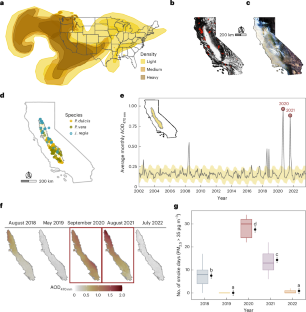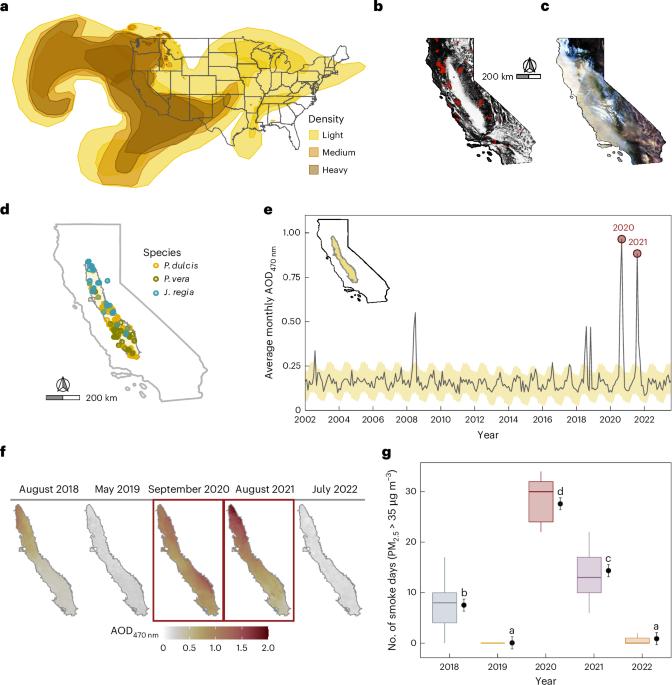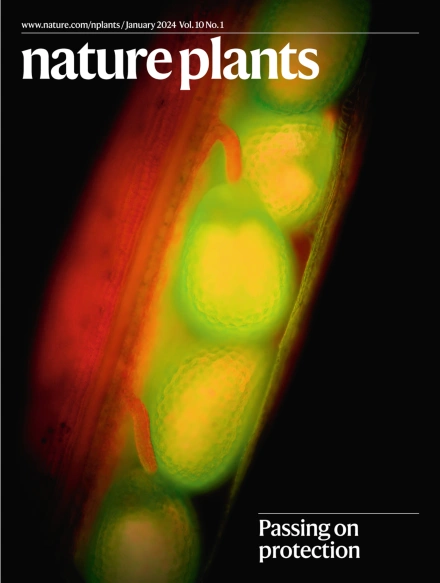特大火灾的烟雾危害树木的碳水化合物储备和产量
IF 15.8
1区 生物学
Q1 PLANT SCIENCES
引用次数: 0
摘要
全球特大火灾的发生率正在上升,导致大片地区长时间笼罩在浓烟中,持续时间长达数天或数周1。在这里,通过将对加利福尼亚中央山谷树木非结构性碳水化合物含量的长期区域观测结果与时空卫星数据相结合,我们提出了令人信服的证据,证明浓烟对三种树木的碳水化合物储存产生了负面影响:Prunus dulcis、Pistacia vera 和 Juglans regia。我们的研究结果表明,烟雾的存在导致非结构性碳水化合物总量显著减少,可溶性糖和淀粉储备的积累也随之减少。这种碳水化合物水平的下降会持续到树木休眠期直至下一季开花,最终导致减产。我们的研究结果突显了一种以前未被认识到的野火威胁,它可能会影响农业和自然环境中的植物健康和生态系统稳定性。本文章由计算机程序翻译,如有差异,请以英文原文为准。


Megafire smoke exposure jeopardizes tree carbohydrate reserves and yield
The global incidence of megafires is on the rise, leading to extensive areas being shrouded in dense smoke for prolonged periods, spanning days or weeks1. Here, by integrating long-term regional observations of non-structural carbohydrate content in trees across California’s Central Valley with spatiotemporal satellite data, we present compelling evidence that dense smoke plumes negatively impact carbohydrate stores in three tree species: Prunus dulcis, Pistacia vera and Juglans regia. Our findings show that the presence of smoke causes a significant decrease in total non-structural carbohydrates, with reductions in the accumulation of both soluble sugar and starch reserves. This decline in carbohydrate levels persists through the trees’ dormancy period into the next season’s bloom, culminating in a reduced yield. Our results highlight a previously unrecognized wildfire threat that could affect plant health and ecosystem stability in both agricultural and natural environments. The incidence and severity of megafires are increasing as a consequence of global change. While the impacts of fires on tree physiology and ecosystem functioning are well studied, how smoke affects these processes is less clear. Here Orozco et al. report that wildfire smoke significantly reduces tree carbohydrate reserves and yields, revealing an overlooked consequence of wildfires.
求助全文
通过发布文献求助,成功后即可免费获取论文全文。
去求助
来源期刊

Nature Plants
PLANT SCIENCES-
CiteScore
25.30
自引率
2.20%
发文量
196
期刊介绍:
Nature Plants is an online-only, monthly journal publishing the best research on plants — from their evolution, development, metabolism and environmental interactions to their societal significance.
 求助内容:
求助内容: 应助结果提醒方式:
应助结果提醒方式:


